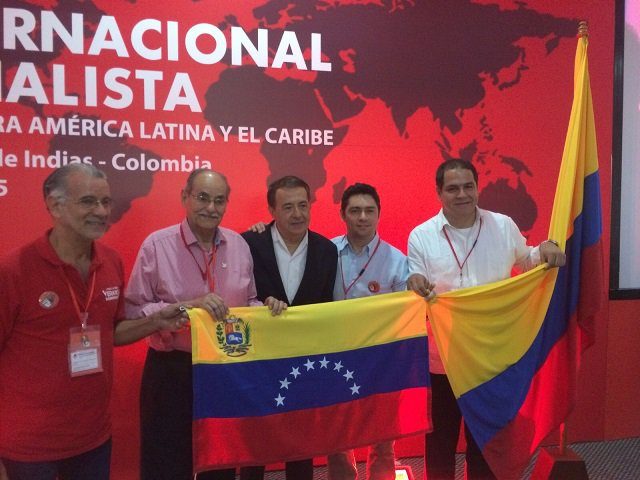Socialism has destroyed Venezuela. State corporate takeovers, strict price controls, and a food rationing system have left the country poor, sick, and literally starving. Socialist political repression has killed countless Venezuelans in the past decade and put an untold number of others in the nation’s notoriously violent prisons.
The United Socialist Party of Venezuela (PSUV), the vehicle late dictator Hugo Chávez used to consolidate power and posthumously hand it over to Nicolás Maduro, has forced the OPEC nation with the world’s largest oil reserves to import oil from – of all places – capitalist bogeyman America.
The party, however, remains in power, challenged by a fractured opposition whose members have deep ties to the Socialist International. If socialism destroyed Venezuela, socialism cannot save it, and the leaders of the opposition appear to be learning this the hard way.
The seemingly ceaseless protests – intensifying in 2014 but growing ever violent today – and the populous Venezuelan diaspora largely resettling in Florida prove socialism not merely a failed ideology, but a vastly unpopular one. Declining support from allies like China and Russia (and, even worse, continued support from Syria and North Korea) prove little hope remains in the long-term stability of the Maduro regime internationally, either. A robust and organized opposition should have a firm chance of reclaiming the future of Venezuela for Venezuelans.
And yet the Venezuelan opposition has largely failed. Its biggest victory was the reclaiming of the National Assembly, the federal legislative body, by majority in December 2015. Then, a coalition of political parties known as the Democratic Unity Roundtable (MUD) promised to use its lawmaking power to free the nation’s political prisoners, rehabilitate the nation’s economy, and topple the then-sixteen-year-old socialist dictatorship.
The MUD has failed in all its objectives. The nation’s most prominent political prisoner, Leopoldo López of the Popular Will party, remains behind bars, serving a 14-year sentence for organizing peaceful protests against the government. The economy is worse than ever, heading for a record 1,600 percent inflation this year, according to International Monetary Fund (IMF) estimates. The dictatorship, meanwhile, appears rejuvenated, having barred the National Assembly from passing laws and stripped Henrique Capriles Radonski, the governor of Miranda state and opposition presidential candidate, of his title and right to run for public office this week.
In addition to promising to expand individual freedom in Venezuela, the MUD vowed to use internationally mediated dialogue to get the Maduro government to agree to its demands. Under the watchful eye of the Vatican, MUD representatives wasted much of 2016 attempting to get Maduro representatives to speak with them, never mind discuss their concerns. By December 2016, the talks had collapsed entirely, with Capriles personally accusing Maduro of “making a mockery of the Pope.”
Many opposition supporters wondered why the MUD held so strongly to the idea of friendly talks with a regime that had imprisoned, tear-gassed, killed, and wounded so many in the opposition – why it had not taken aggressively to toppling socialism in Venezuela. As the talks collapsed, one international entity appeared consistently supportive of the opposition efforts for dialogue, however, condemning the socialist government and baffling casual observers: the Socialist International.
Three of the five articles currently on the Socialist International’s homepage are condemnations of the socialist government of Venezuela. A photo of Leopoldo López behind bars adorns the page. The most recent article condemns the attempt by the nation’s Supreme Court to usurp the National Assembly’s power, calling for “an end to the denial, obstacles and impediments so that the National Assembly of Venezuela, elected by all Venezuelan citizens, can immediately resume its legislative work, with full recognition of its members’ parliamentary immunity.”
“This crisis has inexorably hit the people in Venezuela following poor, authoritarian and centralise [sic] leadership that is indifferent to the suffering caused by its actions,” the article concludes. Note the adjectives used to describe Venezuela’s government: “poor,” “authoritarian,” “centralised.” Notably absent is the adjective with which the regime identifies most: “socialist.”
The Socialist International has invested so heavily in supporting Venezuela’s opposition for the simple reason that a number of MUD coalition parties are also members of the SI, and among the Vice Presidents of the organization is Henry Ramos Allup, the head of the Democratic Action Party (AD), both an SI and MUD member.
Four SI members parties operate in Venezuela: (AD), Popular Will, Movement for Socialism (MAS), and A New Era (UNT). Three of the four are members of the MUD. The fourth, Popular Will, advocates in their manifesto for the second-generation human rights popularized at the United Nations by the Soviet Union: “the right to a comfortable home… the right to fresh food, potable water, health care, and medicine… the right to education.”
The result of this relationship between the SI and the allegedly anti-socialist Venezuelan opposition has been a stunted attempt at restoring fundamental rights and freedoms. With its undue respect to the constitution of Venezuela – implemented by Hugo Chávez in 1999 – and failed dialogue with Maduro, the MUD has been the target of increasing frustration on the part of opposition leaders unaffiliated to the SI, like the aforementioned Capriles and legislator María Corina Machado. This socialist infiltration has not only paralyzed the opposition but threatens to deform the future of a Venezuela without Maduro into something that looks quite a bit like the country’s present and recent past.
Without abandoning socialism, Venezuela will never save itself from socialism, and the sooner opposition leaders realize that the more damage to the nation they can prevent.

COMMENTS
Please let us know if you're having issues with commenting.